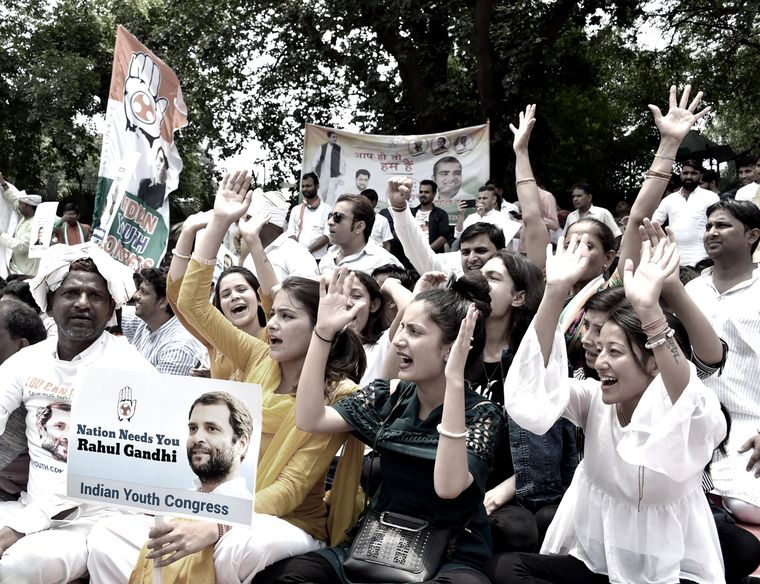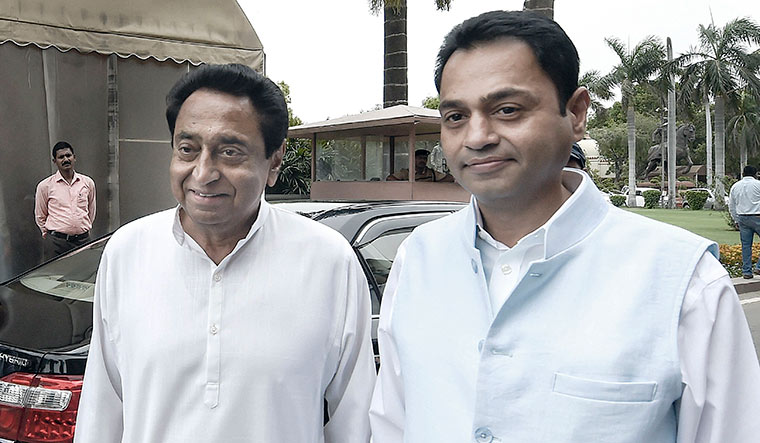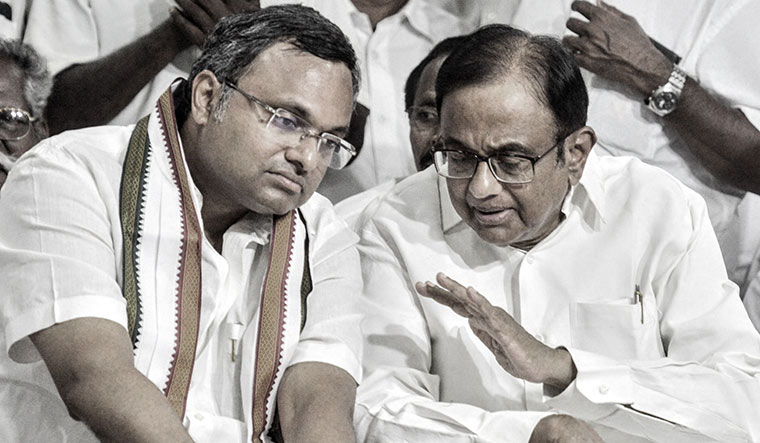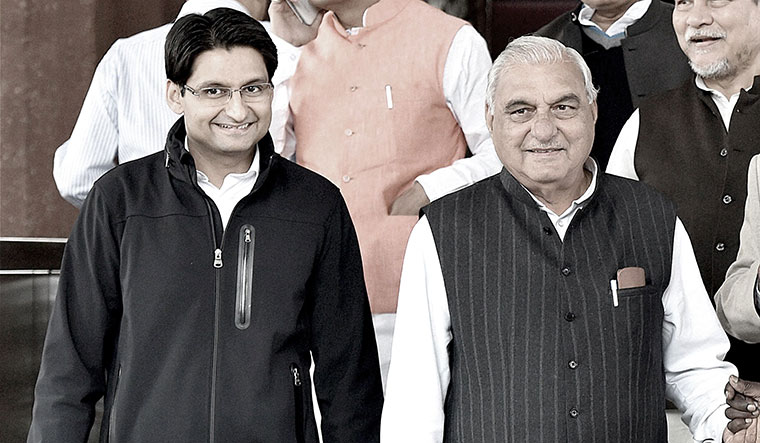In October 2017, two months before he became Congress president, Rahul Gandhi told a gathering in Gujarat that the loss in the 2014 Lok Sabha elections was the best thing to have happened to him. “The BJP thrashed and abused me so much that it opened my eyes,” he said, in a rather self-reflective tone.
The lesson he learnt from that rout stayed with him, and he would repeat it in his subsequent interactions. He projected himself as an antithesis to Narendra Modi, and his campaigns in the assembly elections in Gujarat, Rajasthan, Madhya Pradesh and Chhattisgarh put the Congress back on track.
But Modi used Gandhi’s antithesis-driven strategy to his own advantage in the Lok Sabha elections this year. An astute politician, he wove a narrative of naamdaar versus kaamdaar (dynast vs worker), which won overwhelming support from the electorate.
The Congress’s defeat this time has been harsher for Rahul, who had led the party from the front. He took “100 per cent responsibility” for the poor show, which saw the party winning just 52 seats. Rahul said he would step down as Congress president, but the announcement only deepened the crisis in the party.
A month after the results, THE WEEK spoke to party leaders who are yet to come to terms with the rout. “I feel we really don’t know what is happening in politics,” said former external affairs minister Salman Khurshid. “This defeat is so undeserved. What did we do to entail such a terrible defeat?”
A former member of the Congress’s social media team said the results were worse than its projected worst-case scenario. “Before the counting of votes, we were invited to the Congress war room at 15 Gurudwara Rakabganj Road, for a get-together to watch the results,” said the member. “There was an air of expectancy. Everyone believed that even a poor show would put Congress numbers around 100 seats.”
Said Pawan Bansal, who contested from Chandigarh: “Even now, wherever I go, people ask ‘what happened’. Everyone strongly believed that I would win.”
What has been more disconcerting is how Rahul’s resolve to step down has rendered the Congress rudderless. “The Congress Working Committee (CWC) will decide [on party president]. That decision will [determine] the direction,” said Madhusudan Mistry, Rajya Sabha member who is considered close to Rahul.
While liberal intellectuals have criticised Rahul for his inability to stop the BJP, no Congressman has openly revolted against him. Everyone is asking whether the party can survive without a Gandhi at the helm. Many in the party, like the Youth Congress workers who recently gathered outside Rahul’s residence demanding that he stay on as president, think that it will not.
“Just because someone loses, it does not mean it is the end,” said Mistry. “Look at Brazil. They lost 7-1 in the [FIFA] World Cup [semifinal against Germany in 2014]. But that does not mean they gave up. They fought on.”
P.L. Punia, senior leader and permanent invitee to the CWC, said, “What Rahul is saying is that there should be more leaders handling responsibilities. In the BJP, they have Modi, [party president] Amit Shah and even RSS chief Mohan Bhagwat taking decisions. Here it was only Rahul Gandhi taking them on. He wants to delegate [duties].”
While the exact nature of delineating responsibilities is still not clear, some indications of change are becoming visible. On June 19, Congress disbanded the Karnataka Pradesh Congress Committee, while retaining Dinesh Gundu Rao as state president and Eshwar Khandre as working president. On June 24, K.C. Venugopal, the party’s national general secretary in charge of organisation, announced the disbanding of all district units in Uttar Pradesh. The decision came after review meetings held by Priyanka Gandhi and Jyotiraditya Scindia, the two general secretaries in charge of the state. The Congress’s legislative party leader, Ajay Kumar Lallu, has been entrusted with making organisational changes in Uttar Pradesh East. A separate committee will look into alleged acts of indiscipline by partymen.
There is a common strategic thread that connects the changes in Karnataka and UP. The Congress has either retained or entrusted responsibility to elected representatives, thus sending a message that achievers will be rewarded. The appointment of Adhir Ranjan Chowdhury, a five-time MP from West Bengal, as leader of the party in the Lok Sabha, sends a similar message. An assertive leader, Chowdhury is expected to aggressively challenge the treasury benches.
Despite his decision to step down, Rahul will continue to occupy the preeminent position in the Congress. He has been holding meetings with leaders of various state units, who are keen to give their side of the story. “Reviews are happening,” said Punia, who recently met Rahul as the party in-charge of Chhattisgarh. “Now changes will take place in the state units, including inclusion of new people.”
The AICC headquarters in Delhi has not seen much activity since the rout. The centre of attention is now Rahul’s bungalow at 12 Tughlaq Lane. “We don’t know what will happen,” said Jai Singh Malik, a staunch Congress supporter. “But we know that only Rahul Gandhi can lead us. I hope he is back.” A farmer, Malik hails from Haryana, where assembly polls are due in October.
“Rahul needs to form a clear view about his future now, because it is connected to the Congress’s future,” said a senior party leader from Maharashtra. “If he is determined not to continue and does not want anyone else from the family at the helm, either the Congress would become rudderless or factionalism would rise further. This uncertainty is hurting the party, especially so in Maharashtra, as we have to face assembly elections in October.”
Said another leader in Maharashtra: “There has to be clear-cut leadership in Delhi. Who will the Youth Congress report to, and who will the Seva Dal report to? If you want the party to be truly democratic, why not have a CWC that is also elected. It is now full of ‘yes men’; nobody is allowed to become number 2, 3 or 4.”
A surgery to revive the Congress first calls for a deep analysis of what went wrong, say party leaders. The loss has been attributed to varied factors, ranging from faulty EVMs and failure of the party’s newly-founded data analytics cell, to infighting and gross indiscipline among partymen. One thing everyone agrees is that the Congress failed to gets its message across.
But then, why did southern states like Tamil Nadu and Kerala vote overwhelmingly for the Congress? “It was an anti-Modi vote in Tamil Nadu,” said Manicka Tagore, two-time MP from Virudhunagar. “What worked in our favour is that there was a clear messaging to people. The coalition with the DMK and the left parties worked well. More importantly, people knew who were the leaders. Rahul was projected as PM candidate; Stalin as the chief ministerial one.”
First-time voters, he said, changed the rules of the game. “The new voters do not have time for obfuscation; they want clear direction,” said Tagore. “As the Congress could not [project Rahul as PM], Modi gained across the country.”
The Congress did not want to cross the allies by projecting Rahul as prime ministerial candidate. But it benefited Modi, whose presidential-style campaign set the tone for the elections.
The debate on the alleged corruption in the Rafale deal was swept away by the wave of nationalism created by the Balakot strikes, say Congress leaders. “Things changed after Balakot,” said Punia. “Everyone thought Modi could lead India. Choice of candidates became irrelevant.”
Rachit Seth, a member of the Congress’s communication department, recently published a scathing blogpost on the party’s faulty messaging in the aftermath of Balakot. “We had suggested that the Congress president question the massive intelligence failure [that led to the Pulwama attack]… and Modi’s ‘jungle safari’ in Corbett [national park], even as the attack was on. But people with more powers around Rahul Gandhi lethargically vetoed this narrative,” said Seth.
He also questioned the Congress’s decision to include the promises to remove the Armed Forces (Special Powers) Act and the sedition law in its manifesto, at a time when the overarching sentiment was nationalism. “In 2014, the BJP successfully branded the Congress as the ‘mother of corruption’. In 2019, the BJP successfully branded the Congress as ‘anti-national’,” Seth said.
Bansal said Congress leaders were becoming complacent and disconnected with the grassroots. “Some leaders in Delhi don’t travel out,” he said. “There needs to be deep introspection. The way the RSS managed booths and campaigned, we have to counter that.”
The consolidation of Hindu votes, which overrode caste considerations, also favoured the BJP. Punia, who headed the Congress’s scheduled caste cell, said the Congress’s dalit support base shrank. “Everybody changed. They acted as Hindu voters,” he said. Apparently, the Hindu nationalist sentiment was so strong that it halted the caste-based alliance between the Bahujan Samaj Party and the Samajwadi Party in Uttar Pradesh.
Khurshid, who came third in Farrukhabad in UP, said he was still not ready to believe that India’s national character has changed. “There is silence on the streets; there have been no grand celebrations after the results,” he said. “It may be a conscious vote for Modi, but not a passionate vote. Voters may have expressed confidence in Modi, but I don’t see any affection for him.”
The mood will shift once economic challenges emerge, said Khurshid. An AICC member, Khurshid wants the Congress to put its house in order, make its first line of leaders more visible to the people, and develop a communication strategy. “I don’t see any objective condition that can accommodate Rahul’s departure,” he said. “Even if he insists [on stepping down], it doesn’t mean he shouldn’t remain a leader.”
A clear, immediate task is to stem factionalism in the state units. Reports of infighting have been trickling in from states that will go to the polls this year—Maharashtra, Haryana, Jharkhand and Delhi. State leaders have been accused of keeping their family interests above the organisation’s. “Rahul was against giving tickets to Bhupinder Singh Hooda and his son Deepender. But others insisted. Both of them lost,” said a Haryana leader.
In review meetings, Rahul had criticised senior leaders like Hooda, Ashok Gehlot, Kamal Nath and P. Chidambaram for having focused more on getting their sons elected.
Tagore wants the Congress to adopt a three-pronged strategy—stitching up strong alliances, building an effective organisation and setting an alternative narrative. “Of 61 crore voters, 40 crore did not vote for the BJP,” he said. “Now, one cannot say we will declare the prime minister after elections. People want to see whom they are voting for. Look at the way the BJP and the RSS target Rahul; they are worried of him.”
Also read
- I told Tharoor it is better if there is a consensus candidate, says Kharge
- Cong president polls: Gehlot backs Kharge, says Tharoor is 'elite class'
- Rahul told me a non-Gandhi should be Cong president: Gehlot
- Congress leadership has no time to set things right: Azad
- Karnataka Congress awaits a new, effective state leadership
- 'Hindutva Lite' not the best strategy for the Congress
- Congress should consider getting Mamata on board to challenge BJP
Even BJP leaders concede that Rahul has come of age as a politician. “One can question the effectiveness of Rahul Gandhi raising the Rafale issue,” a BJP leader told THE WEEK during the elections. “But he stood firmly on the issue, despite not receiving support from within or outside the party. It shows that he is maturing.”
Many state leaders, however, complain that Rahul is inaccessible and his group of advisers is disconnected with the reality. Over the years, it has cost the party several promising leaders. In Assam, Himanta Biswa Sarma quit the Congress and joined the BJP in 2015, saying the Congress high command was so dependant on Gandhi family loyalists that ground workers were feeling demoralised. Sarma now handles key portfolios in the BJP government in Assam.
The Congress faces the stiffest challenge from Modi and Amit Shah, who have redefined the rules of the game. Under them, the BJP has become a nimble-footed behemoth that is powered by ideologically committed workers. In the past five years, the BJP has worked with the zeal of an opposition party, while the Congress became active just a few months before the Lok Sabha elections.
More than 134 years after it was formed, the Congress perhaps has become a bit too set in its ways. It needs a leadership that is as decisive and agile as that of the BJP. Congress leaders say Rahul should begin by travelling across the country, connecting with voters and becoming more accessible to party workers. Every step he takes will go a long way towards reviving India’s grand old party.
With Dnyanesh V. Jathar






